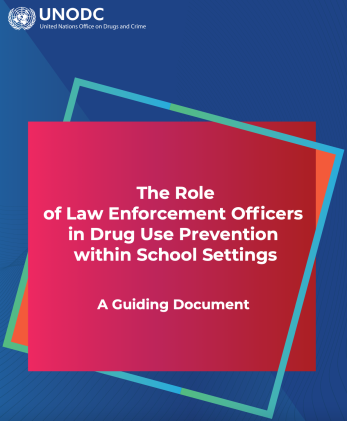Αναζήτηση
Reduce Drug Related Crime
Community-based treatment, care, and supervision for people with substance use problems who are involved with the justice system.
Effectiveness of Extended Screening and Brief Intervention (X-SBI) on Substance Misuse and Related Outcomes in Correctional Settings
Abstract
Background:
Screening and brief intervention (SBI), effective in community health care, show inconsistent results in correctional settings (CS). We hypothesized that SBI needs adaptation for the incarcerated population. The study...
Screening and brief interventions for substance use in emergency departments in the Western Cape province of South Africa: views of health care professionals
Abstract
As part of the formative phase of screening and brief interventions (SBIs) for substance use amongst patients presenting for emergency services in South Africa, the present study explored health care providers’ attitudes and...
Patient outcomes and experience of a task-shared screening and brief intervention service for problem substance use in South African emergency centres: a mixed methods study.
ABSTRACT
Background
Screening, brief intervention and referral to treatment (SBIRT) programmes have resulted in generally positive outcomes in healthcare settings, particularly for problem alcohol use, yet implementation is hampered by...
Implementation of a screening, brief intervention and referral to treatment programme for risky substance use in South African emergency centres: A mixed methods evaluation study
Abstract
Background
Screening, brief intervention, and referral to treatment (SBIRT) for risky substance use is infrequently included in routine healthcare in low-resourced settings. A SBIRT programme, adopted by the Western Cape...
Substance use disorder screening and brief intervention in routine clinical practice in specialist adult mental health services: A systematic review
Abstract
Background and Objectives:
Substance use disorders co-occurring with other mental health disorders are common and harmful. Clinical guidelines often recommend substance use screening and brief intervention though evidence about...
Screening, brief intervention, and referral to treatment (SBIRT) for cannabis: A scoping review
Highlights
• Scoping review found inconsistent support for SBIRT for cannabis.
• Use of cannabis-specific screening could increase engagement.
• Modifications to brief interventions yielded inconsistent outcomes.
• Limited research has...
A randomized study of the use of screening, brief intervention, and referral to treatment (SBIRT) for drug and alcohol use with jail inmates
Abstract
Background: Screening, brief intervention, and referral to treatment (SBIRT) is an evidence-based practice that has been shown to reduce alcohol and drug use in healthcare, educational, and other settings, but research on the...
Considerations for Introducing SBIRT into a Jail Setting.
INTRODUCTION
Nearly all chronic substance users enter the criminal justice system at some time in their use career. Drug use is closely associated with crime, and its prevalence among offenders is high (MacCoun et al., 2003; Newcomb et al...
Substance use and recidivism outcomes for prison-based drug and alcohol interventions.
ABSTRACT
We conducted a systematic review to examine the substance use and recidivism outcomes of prison-based substance use interventions. We searched public health, criminology, and psychology databases, and conducted forward and...
Lessons Learned from a Mixed Methods Evaluation of a Jail-based Co-Occurring Disorders Treatment Program.
ABSTRACT
This study evaluated the planning, implementation, and preliminary outcomes of a US Bureau of Justice Assistance funded justice mental health focused reentry program for offenders with co-occurring substance use and mental health...
Evaluation of an in-jail and post-release comprehensive treatment model for opioid use disorder in Massachusetts
Abstract
Introduction: Incarcerated individuals with opioid use disorder experience high rates of opioid-related mortality upon release. Buprenorphine and methadone are effective at reducing mortality rates in this population, but evidence...
Treating drug abuse and addiction in the criminal justice system: improving public health and safety.
ABSTRACT
Despite increasing evidence that addiction is a treatable disease of the brain, most individuals do not receive treatment. Involvement in the criminal justice system often results from illegal drug-seeking behavior and...
Providing substance use disorder treatment in correctional settings: knowledge gaps and proposed research priorities—overview and commentary.
ABSTRACT
This manuscript is the product of the authors’ discussions, literature overview, and consultation with experts in the field, and identifies important gaps in the evidence base for substance use disorder (SUD) treatment...
Assessment and Treatment of Substance Use Disorders in Jails. In Handbook of Mental Health Assessment and Treatment in Jails.
Abstract
The high rates of substance use in the incarcerated population are well established. However, the effective management and treatment of substance use disorders in jails can be complicated by a number of factors. This chapter first...
Interventions to reduce harms related to drug use among people who experience incarceration: systematic review and meta-analysis
Abstract
Background: Mortality, suicide, self-harm, and substance use are elevated among people who are incarcerated. There is a wide range of heterogeneous interventions aimed at reducing these harms in this population. Previous reviews...
Criminal Justice Professionals’ Attitudes Toward Mental Illness and Substance Use
ABSTRACT
Despite the high prevalence of behavioral health disorders in justice settings and prior research on the importance of attitudes in successful treatment outcomes for behavioral health populations, few studies have examined...
Evidence-based treatment practices for drug involved adults in the criminal justice system.
Abstract
Objective
The aim of this study was to estimate the extent and organizational correlates of evidence-based practices (EBPs) in correctional facilities and community-based substance abuse treatment programs that manage drug...
Reducing Drug-Related Crime
The Situation of Drugs Law Enforcement in Indonesia
Justice Decisions that Impact Drug Related Crime
Share the Knowledge: ISSUP members can post in the Knowledge Share – Sign in or become a member


